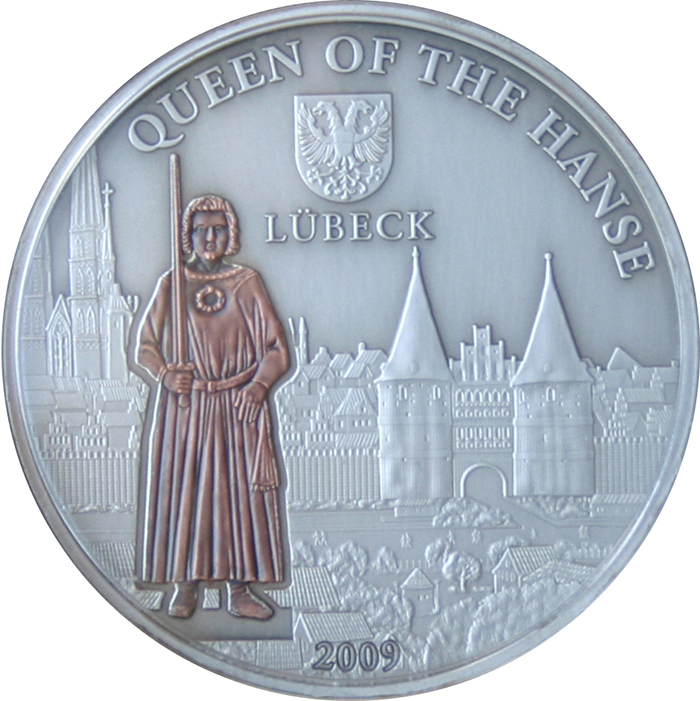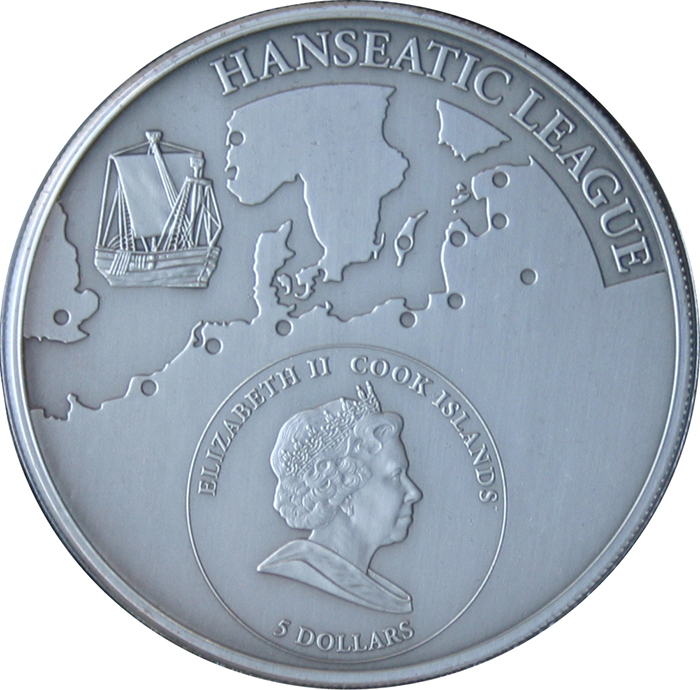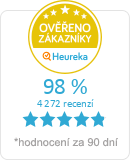Silver Coin Lübeck 2009 Standard Cook Islands
The product cannot be ordered now.
NOT IN STOCK
Detailed description
RAZITKO_POSTOVNE_ZDARMA_NENI
Hanseatic League Sea Trading Route series
An exclusive silver (antique) coin issued by the Cook Islands in 2009 from the Hanseatic League Sea Trading Route series depicts the German port city of Lübeck and a bronze statue of a Hanseatic League member on the reverse. The inscriptions "QUEEN OF THE HANSE", "LÜBECK" and the year of issue complete the obverse. The obverse shows the trade route of the Hanseatic League and a portrait of Queen Elizabeth II..
The coin comes in a blue gift box with grey and silver trim along with a certificate of authenticity in a limited edition of only 1000 pieces for the whole world!

Lübeck
Lübeck is a former Hanseatic city and municipal district in northern Germany, specifically in the southeast of the state of Schleswig-Holstein, located on the Baltic Sea. After the capital Kiel, it has the largest population in the federal state and is the largest city in Schleswig-Holstein in terms of area. The medieval city centre is a UNESCO World Heritage Site.
The area of present-day Lübeck was settled after the end of the last ice age. There are several Neolithic dolmens in the area. Around 700 AD, the area of present-day Lübeck was settled by Slavs, after whose arrival the previous Germanic population moved westwards.

At the beginning of the 9th century, Charlemagne expelled the Saxons, who had resisted his attempts to Christianise them, and brought his allies, the Slavs of Polab, to replace them. They founded the settlement of Liubice (Czech: Milá) on the banks of the River Trava about 4 km north of the present-day centre of Lübeck. This became the most important settlement of the Obodrites in the 10th century and a castle was built there. In 1128, Liubice was burnt down by the pagan tribe of the Rán.
The modern town of Lübeck was founded in 1143 by Adolf II, Count of Schauenburg and Holstein, as a German settlement on the river island of Bucu. He founded a new castle here, first mentioned in 1147 by Helmold. In 1158 Adolf ceded the castle to Henry the Lion. After Henry's fall in 1181, Lübeck became a free imperial city for eight years.
Frederick I Barbarossa put a ruling council in charge of the city, which existed until the 19th century. This council was dominated by merchants, whose commercial interests dominated Lübeck's politics for centuries.
The ownership of the town and castle then changed hands. Until 1192 Lübeck was part of the Duchy of Saxony, then it was part of Holstein until 1217 and finally part of Denmark until the Battle of Bornhöved in 1227.
Around 1200, Lübeck became the main port for colonists sailing from here to the Baltic territories conquered by the Livonian Order and later by the Teutonic Knights. In 1226, Emperor Friedrich II made the city a free imperial city and the present city area became the main part of the newly formed city state of the Free and Hanseatic City of Lübeck, which was a federal state of the German Empire from 1871 until 31 March 1937.
In the 14th century, Lübeck became the most powerful member of the Hanseatic trade organisation and was referred to as the "Queen of the Hanseatic League". From 1806 to 1810, Lübeck was occupied by the French Empire and subsequently annexed by it on 13 December 1810 and incorporated into the newly created French department of Bouches-de-l'Elbe from 1 January 1811 to 1813. Since 1 April 1937 it has been part of Schleswig-Holstein
Product Specifications
Application form
Thanks to our position on the market, we can try to provide you with a product that is currently sold out or unavailable for a longer period of time. Simply fill in the application form and we will contact you as soon as we are able to secure the product.
Filling in the application form is not binding for you.
Buyback contact form
We will be happy to buy investment metals purchased from us or from our competitors. Our customers always get the highest price offered at any given time. Fill out the form below and we will contact you. Thank you for your trust.




